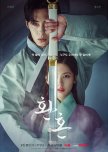
Simply outstanding
Moving was an absolute thrill from start to finish. It delivered a perfect balance of action, emotion, and storytelling, making it easily one of the best Korean dramas I've ever watched. The pacing was relentless, ensuring that there was never a dull moment. I only wish the episodes were longer than an hour—I enjoyed it so much that I’m already on a rewatch, something I rarely ever do.One of the highlights for me was the heartwarming friendship between Bong-seok and Hee-soo. Their interactions consistently brought a huge smile to my face, and their bond felt so natural and authentic. The teenage characters actually acted their age, which is refreshing to see in a high school-centered narrative. The actors did a phenomenal job portraying them with depth and sincerity.
The show took a thematic shift when the parents' backstories were introduced midway. While the pacing changed, I found myself loving this aspect even more than the teen drama elements at the beginning. The love stories of Kim Doo-shik and Mi-hyun, as well as Jang Ju-won and Hwang Ji-hee, were beautifully written and filled with palpable chemistry. Their relationships added layers of emotional depth to the show.
Guryongpo's backstory was another standout aspect. The way they did a deepdive into his backstory was great (I only wish they explored Kindooshik's backstory in the same way.) His character arc was compelling, and his fight scenes were an absolute spectacle—choreographed brilliantly with a touch of humor. The motel hallway fight scenes were reminiscent of *Oldboy*, and the final battles were just as epic. I had a huge smile on my face throughout the last two episodes, especially during Jang Ju-won and Jaeman’s fights. The background music during these action sequences was fantastic, enhancing the intensity and excitement. The overall OST was stellar and complemented the series beautifully.
At the beginning, the show incorporated heavy symbolism through colors in both dialogue and imagery to characterize the three main kids with superpowers—yellow for Bong-seok, orange for Hee-soo, and red for Gang-hoon/Jaeman. These colors were prominently displayed whenever their stories were explored, and while they added to the visual appeal, I had hoped for a deeper narrative significance beyond just aesthetic symbolism.
I saw some reviewers complaining about the graphics and VFX. I thought it was outstanding—I did not notice any wires or whatever. The VFX was very believable.
Moving delivered an incredibly satisfying experience, and I am beyond excited for Season 2!
Was this review helpful to you?

Alchemy of Souls Season 2: Light and Shadow
25 people found this review helpful
**Alchemy of Souls Season 2: A Disappointing Follow-up to a Strong First Season**
*Alchemy of Souls* Season 1 was a thrilling ride filled with rich lore, compelling characters, and an exciting hero’s journey for Jang Uk. It was a show that, for the most part, felt like a breeze to watch. However, Season 2 struggled to maintain the same momentum, and by the halfway point, it became more of a chore than an engaging experience.### Strengths of the Show
One of the biggest strengths of Season 2 was the performances of Lee Jae-wook (Jang Uk) and Shin Seung-ho (Crown Prince). Lee Jae-wook was convincing as the brooding, all-powerful mage weighed down by his burdens, and Shin Seung-ho was thoroughly entertaining as the Crown Prince, bringing charm and humor to the screen. Their interactions remained a highlight, with their dynamic being just as amusing as in the first season.
Another enjoyable aspect was the side romance between Park Jin and Maidservant Kim. Their story provided some lighthearted and touching moments, making them one of the more entertaining older couples in the series.
### Weaknesses and Disappointments
Despite these strong performances, the overall narrative of Season 2 felt lackluster. One of the most significant disappointments was the handling of the central romance. The chemistry between Jang Uk and Jin Bu-yeon (who has Naksu’s body but no memories) never felt organic. Their relationship felt rushed—kissing as early as Episode 2—making it difficult to invest in their bond. Unlike the deep, slow-burn relationship between Jang Uk and Mu-deok in Season 1, this pairing lacked emotional weight.
Additionally, the show’s pacing felt uneven. The first five episodes were tolerable, but after that, it became tedious to watch. Perhaps binging both seasons back-to-back contributed to the fatigue, but by the latter half, the story lost its grip, and watching felt more like an obligation than a pleasure.
Jin Mu’s continued presence as the main villain was another source of frustration. He felt like an overused antagonist, and the negative characters in general became tiresome to watch. The stakes never felt truly engaging, and the soul shifters, which initially seemed like they would be a massive threat (almost zombie-like in the first episode), never really played out in that way.
### The Lingering Absence of Mu-deok
The biggest blow to Season 2 was the absence of Jung So-min as Mu-deok. While the show initially made minimal effort to acknowledge her presence, later episodes did include some flashback scenes featuring the original actress. However, these moments were not enough to fully recapture the emotional depth of Season 1. The connection between Jang Uk and Mu-deok was so compelling that it was difficult to accept a new female lead, and that disappointment never truly faded throughout the season.
### Final Thoughts
While Season 1 had a devastating yet powerful ending that left a strong impact, Season 2 failed to evoke the same emotions. The overall storytelling lacked the depth and engagement that made the first season so enjoyable.
In the end, *Alchemy of Souls* Season 2 felt like an underwhelming follow-up. It had its moments—strong performances, fun character interactions—but it was ultimately weighed down by a lackluster romance, sluggish pacing, and a story that felt like it had run its course. While Season 1 was a delight, Season 2 overstayed its welcome.
Was this review helpful to you?

This review may contain spoilers
Thoroughly enjoyable 1st season
From the very first episode, Alchemy of Souls had me hooked. The intricate lore, the unique world-building, and the promise of an epic hero’s journey immediately piqued my interest. Jang Uk’s path, riddled with obstacles and destiny-driven struggles, was something I was excited to watch unfold.One of the standout elements for me was the relationship between Jang Uk and Mu-deok. Right from the start, their dynamic was refreshing—built on trust, understanding, and an easy camaraderie. The scene where Jang Uk falls sick after receiving an immense energy boost and Mu-deok tends to him was particularly striking. Up until that point, there hadn’t been any explicitly intimate moments between them, yet this scene carried an unspoken depth, making it feel as if they had known each other forever. Their relationship was a highlight, and I only wish the series had given them even more screen time together.
Apart from Jang Uk and Mu-deok, I also enjoyed Mu-deok’s interactions with the Crown Prince. Their witty banter added a layer of charm to the show. On the other hand, I felt that some of the relationships between the younger characters took up more screen time than necessary. While I thoroughly enjoyed the older couples’ scenes, I would have preferred a greater focus on the main leads.
The hero’s journey aspect, which was the biggest draw for me, felt somewhat underwhelming by the end. While Jang Uk’s rise was satisfying to watch, I wished there had been more of his personal growth throughout the series. Similarly, Mu-deok’s character, despite being immensely powerful in her past life, was often relegated to the role of a mere maid. It would have been more fulfilling to see her take on a more active role in shaping events.
For the most part, the show felt like a breeze to watch, especially up until the first 15 episodes. The pacing was engaging, and the mix of action, humor, and romance kept me invested. However, the last few episodes were not as enjoyable. The storytelling felt a bit rushed, and some plot developments were not as satisfying as the earlier parts of the series.
That being said, the show excelled in many areas. The actors delivered stellar performances, the cinematography was stunning, and the visual effects—especially in the action sequences—were quite impressive. The humor was well-placed, providing a balance to the intense moments. However, I personally would have liked to see more romantic moments between Jang Uk and Mu-deok.
The ending left me with mixed feelings. Jang Uk’s literal rise from the ashes was one of the coolest moments in the entire season, and it was a fitting culmination of his struggles. However, Mu-deok’s abrupt downfall felt unfair, especially since she wasn’t fully conscious during those final moments. I wish the show had dedicated more time to her and Jang Uk in that critical scene where she stabbed him—it felt rushed considering their journey together.
Overall, Alchemy of Souls Season 1 was an engaging and visually captivating show with strong performances and a fascinating world. While some elements could have been developed further, it still delivered a compelling story. Now, as I move on to Season 2, I’m eager to see how the story unfolds from here.
Was this review helpful to you?

Few good men
I initially really liked the first two episodes of *One Spring Night* and the initial spark of chemistry between the leads. However, as the story progressed, the female lead’s character started to become incredibly aggravating. This was especially evident when Ji-ho explicitly stated that he could not be just friends with her, yet she continued to show up around him. Her behavior became more frustrating, making the middle episodes up to episode 10 particularly difficult to get through. Difficult as in it is never boring and it makes one feel a lof of emotions but not in a good way. She somewhat redeemed herself in the final episodes, but I still did not like her. She was mean, selfish, and I disliked the way she treated the male lead. Her character is interesting in the sense that she feels like the antithesis of Yoon Jin-ah from *Something in the Rain* (SITR).Some viewers argue that the female lead cheated on her boyfriend when she met Ji-ho, but I did not see it that way at all. However it did feel like she was stringing along both of them for sometime and i felt some sympathy for Ki-seok, however it became apparent in later episodes that he was an outright antagonist.
I also found the way the male characters were written to be disappointing. They were either one-dimensional villains who inflicted emotional or physical violence on women or weak, foolish individuals. This made it hard to truly connect with any of them. I also hate the "ML's idiot friend causing unintentional havoc in his life" trope as a catalyst to move the story along and there was some of it here as well.
Another frustrating aspect of the show was its repetitive nature. Many scenes involved the same characters meeting episode after episode, having nearly identical conversations. This quickly became tiring and made the pacing feel sluggish at times. Instead of progressing naturally, the show often felt like it was stuck in a cycle of repetitive dialogue and interactions.
I believe this show is meant to be part of the same oeuvre as *Something in the Rain*. As I mentioned earlier, the female lead feels like the direct opposite of Yoon Jin-ah. Other similarities include recurring actors and a similar musical tone. However, the music here was not as intrusive as it was in *Something in the Rain*.
Ultimately, I enjoyed *Something in the Rain* much more than this show, primarily because the female lead in *One Spring Night* never really grew on me. Additionally, I did not feel there was any real chemistry between the two leads, making the romance feel unconvincing. While the show remained engaging enough for me to finish, it left me feeling more frustrated than satisfied.
Was this review helpful to you?

This review may contain spoilers
Noona Ate My Lunch :(
Few dramas have made me feel as deeply as *Something in the Rain*. From its moody nighttime cinematography to the jazzy feel of the music, the show creates an intimate, cozy atmosphere that lingers long after the credits roll. But more than its aesthetic, it’s the raw, sometimes frustratingly real portrayal of love and human flaws that made this drama stand out.The relationship between JA and JH and their situation viz-a-viz their family is complicated and at times very frustrating to watch. Speaking of the leads, they are also flawed as any person. JA takes JH for granted throughout much of the show, and when she messes up, her apologies often feel oddly flippant, lacking real weight. JH, on the other hand is immature, struggles with pride, which ultimately leads to their breaking point. He reaches his limit when JA’s mother mistreats him, and instead of working through the issue together, his solution is to demand that JA leave everything behind and move to the U.S. with him—an unrealistic, selfish choice. In the end, he’s the one who abandons her. That being said, JA also bears responsibility for their downfall. She was weak and confused when it came to dealing with her family, and she never truly protected JH from her mom neither did she assured JH through her actions that their situation with her family could be resolved. That is why he wanted to leave everything and run away
While their relationship had moments of deep frustration, I wouldn’t change how the show portrayed them. Their issues were laid bare but they never have a deep realistic conversation about it as a couple. Even when JH gets mad at JA for her actions, he never really lets his true feeling out (until the end in a drunken tirade and specially during the argument they have in final episode when they are at his house. It felt like a natural breaking point for their relationship which by they way would have been a more real ending (but im happy with the ending they went with, i would have been devastated if they they ended with JA moving to jeju and JH going back to US)). This makes their conflicts feel repetitive rather than leading to actual growth. That being said it did not bother me enough. It feels like a deliberate writing choice and im ok with it
What actually bothered me was there were too many scenes where two characters would sit opposite each other in complete silence for what felt like minutes. These moments could have been more impactful if used sparingly, but their frequent appearance made them lose their emotional weight. Additionally, while the soundtrack was beautiful at first, the same songs were played so repetitively that they became distracting rather than enhancing the mood. .
One of the highlights of the show was the way it portrayed workplace harassment. The storyline felt painfully realistic—showing how, in reality, the actual perpetrators of sexual harassment often get off with little more than a slap on the wrist, while the victims are the ones who suffer real consequences. The way this plot played out added depth to the show and reinforced its grounded, often frustratingly true-to-life tone. It added depth to the show and reinforced the themes of power and societal pressure that ran throughout.
Despite its flaws, *Something in the Rain* is a drama I genuinely loved. It’s the kind of show that stays with you, not because everything was perfect, but because every piece—whether frustrating, beautiful, slow, or heartbreaking—added up to something unforgettable.
Was this review helpful to you?



